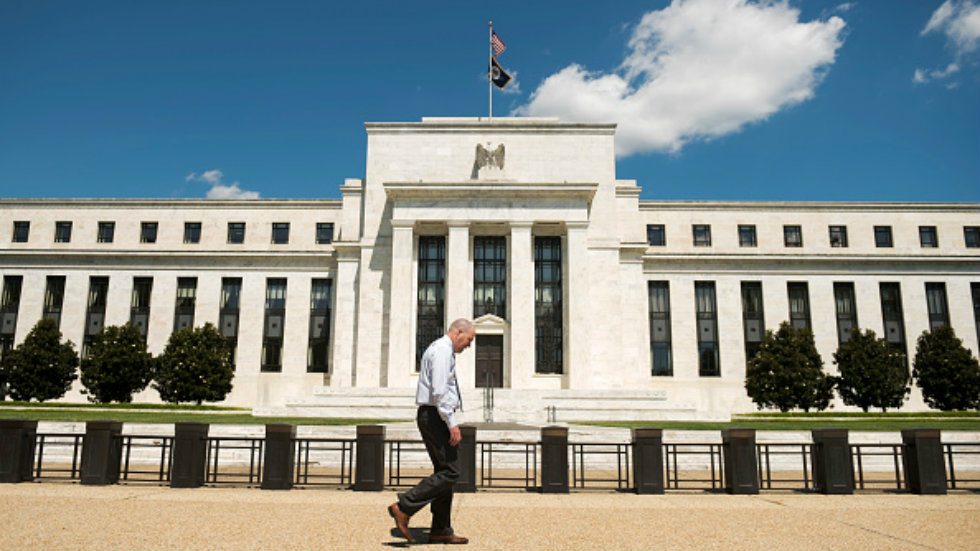On The Money — Fed puts strict limits on trades by top officials
Happy Friday and welcome to On The Money, your nightly guide to everything affecting your bills, bank account and bottom line. Subscribe here: digital-staging.thehill.com/newsletter-signup.
Today’s Big Deal: The Federal Reserve just cracked down on a series of trading scandals and lawmakers are debating new trading rules for Congress. We’ll also look at Biden steering the U.S. away from a shutdown and the potential financial implications of a Russia sanction bill.
But first, there’s a new app meant to help folks who depend on insulin pumps.
For The Hill, we’re Sylvan Lane, Aris Folley and Karl Evers-Hillstrom. Reach us at slane@digital-staging.thehill.com or @SylvanLane, afolley@digital-staging.thehill.com or @ArisFolley and kevers@digital-staging.thehill.com or @KarlMEvers.
Let’s get to it.
Fed releases strict trading rules for top officials

The Federal Reserve on Friday finalized strict new investment rules for top policymakers months after three top bank officials resigned under fire over financial trades.
- Members and top staffers of the Federal Open Market Committee (FOMC), a panel of Fed officials responsible for setting monetary policy, will be banned from buying and holding a wide range of investment products as of May 1.
- Covered officials will also be banned from making financial trades without advance approval from ethics officers and in the run-up to policy meetings.
- The new rules apply to members of the Fed board of governors, presidents and first vice presidents of regional reserve banks, top FOMC staff officers, the manager and deputy manager of the System Open Market Account, their spouses and minor children and anyone else designated by the chair of the Fed board.
The Fed first outlined its new investment rules in October after financial records revealed heavy trading conducted by three of the top officials responsible for setting interest rates and overseeing the bank’s emergency lending programs during the pandemic.
Sylvan has more here.
FAMILY FINANCES
Congressional stock trading ban must include spouses, lawmakers say
Any bill to prevent lawmakers from trading stocks must apply to their immediate family members, Reps. Abigail Spanberger (D-Va.) and Chip Roy (R-Texas), the authors of a stock trading ban proposal, said Friday.
Several stock trading proposals circulating through Congress omit lawmakers’ spouses and dependent children, and Democratic leaders have warmed to the idea of a bill that extends a stock trading ban to senior congressional staffers but not spouses.
“It would defy logic to say you’re not going to include your immediate family, because I think everybody would see that for what it is,” Roy said during an event hosted by Issue One, the National Taxpayers Union and the Project on Government Oversight.
- Good government experts warn that lawmakers cannot restore trust in Congress if they exempt spouses and dependent children from a stock trading bill.
- They point to Speaker Nancy Pelosi (D-Calif), who does not trade stocks but has come under fire for her husband’s numerous transactions.
- The Spanberger-Roy bill, which has 50 House co-sponsors, would require all members of Congress and their immediate family to place their stocks into a blind trust, with violators facing a fine equal to their entire congressional salary.
Read more from Karl here.
SHUTDOWN AVERTED
Biden signs bill to extend funding, avoid government shutdown
President Biden on Friday signed a bill to keep the government funded into March ahead of a midnight deadline that would have led to a shutdown.
The bill funds the government through March 11 at current levels, giving lawmakers another three weeks to negotiate a larger spending deal to keep the government funded through the rest of the fiscal year that ends in September.
The House passed the stopgap measure earlier this week, and the Senate followed by approving the bill on Thursday with a 65-27 vote.
- The Senate’s passage of the funding bill followed days of drama as senators tried to get a deal that would clear a path for the legislation. Because of the Senate’s rules, and the looming deadline, they needed buy-in from all 100 members to speed up the bill to meet the deadline.
- Senators spent days haggling over what amendments would get votes. In the end they agreed on three: two related to Biden’s vaccine mandates and a third from Sen. Mike Braun (R-Ind.) on balancing the budget.
The Hill’s Brett Samuels has more here.
BE IN THE KNOW
Sign up for NotedDC: your insider’s pass to the beat of the Beltway. The Hill’s latest newsletter is as fast-paced, provocative, and incisive as DC itself.
NOT SO SWIFT
White House: Kicking Russia out of SWIFT unlikely to be in initial sanctions package
The White House said on Friday that removing Russia from the SWIFT international banking system, if it decides to invade Ukraine, is not part of the first sanctions package the Biden administration would impose.
“All options remain on the table. But it’s probably not going to be the case that you’ll see SWIFT in the initial roll out package,” Daleep Singh, a deputy national security adviser, told reporters.
- The Society for Worldwide Interbank Financial Telecommunication (SWIFT) is a system that handles international financial transfers and is overseen by the G-10 central banks. More than 200 countries are part of SWIFT and over 11,000 financial institutions use it.
- Singh said we are “converging on the final package” if Russia launches a full-scale invasion in Ukraine. The cost to Russia from the sanctions package would be “immense” to its economy and strategic position, he added.
Singh defended the decision to not kick Russia out of SWIFT when asked about previous comments that the administration would impose the maximum sanctions at the get go.
“I can assure you the measures that we have prepared, the severity of those measures, and the institutions that we would impose them upon, and the immediacy of those sanctions are among the most severe financial sanctions that have ever been contemplated,” he said.
Read more here from The Hill’s Alex Gangitano.
Good to Know

Almost 4 million American children fell into poverty last month after the expanded child tax credit (CTC) expired, according to a study released Thursday by the Center on Poverty and Social Policy at Columbia University.
The lapse of monthly CTC payments in January pushed 3.7 million children below the poverty line, according to federal data analyzed by the Columbia researchers. The child poverty rate rose from 12.1 percent in December to 17 percent in January — an increase of 41 percent.
Here’s what else have our eye on:
- Facebook whistleblower Frances Haugen reportedly filed two new complaints with the Securities and Exchange Commission arguing the tech giant misled investors about its efforts to mitigate the spread of misinformation on climate change and COVID-19.
- The U.S. Embassy in Mexico announced Friday that a ban on avocado imports into the U.S. has been lifted.
- A cargo ship carrying luxury cars is adrift in the Atlantic Ocean after its crew abandoned ship to escape a fire.
That’s it for today. Thanks for reading and check out The Hill’s Finance page for the latest news and coverage. We’ll see you Monday.
Copyright 2024 Nexstar Media Inc. All rights reserved. This material may not be published, broadcast, rewritten, or redistributed..











